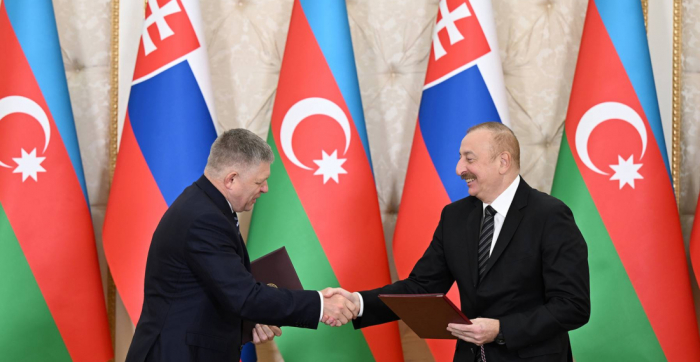Diplomatic engagements between Azerbaijan and EU member states have notably intensified over the past two years. Azerbaijan’s rising significance as an alternative energy provider and a vital interconnector in Europe-Asia connectivity via the Middle Corridor has spurred this heightened activity and increased interest in Azerbaijan. Within the first ten days of May, Baku hosted two European leaders, from Slovakia and Bulgaria, resulting in the signing of significant agreements aimed at enhancing and broadening bilateral relations.
On 6 May, Slovakia’s Prime Minister Robert Fico paid a visit to Azerbaijan for the first time in his political career. The sides signed important agreements in the course of this visit which have opened a new chapter in the relations between Azerbaijan and Slovakia. Slovakia has become the 10th member of the EU with which Azerbaijan signed declaration on strategic partnership. Azerbaijan has earlier launched strategic partnership with Romania (2011), Croatia (2013), Italy (2014), Hungary (2014), Czech Republic (2015), Bulgaria (2015), Poland (2017), Latvia (2017) and Lithuania (2017). This constitutes more than one-third of the EU members and provides good basis for the relations between the sides.
The so-called “Joint Declaration on the Establishment of Strategic Partnership between the Republic of Azerbaijan and the Slovak Republic” has been possible thanks to the mutual interest in deeper bilateral ties and common position on critical issues in international relations. “This is a very serious political document, a document that raises our relations to the highest level”, said Azerbaijani President Ilham Aliyev in his press conference with the Slovakian leader.
This level of relations between the two countries has been reflected in three particular areas. Above all, Baku and Bratislava agreed on the establishment of joint production capacities in the field of defense industry. Considering the growing military industry capabilities of Slovakia which marked 4 times growth in the export revenues since the early 2022, the cooperation in this sphere promises benefits for both countries. “[In the joint production of weapons in Azerbaijan] technology will come from Slovakia and funding from Azerbaijan. The weapons to be produced will either be exported or remain in Azerbaijan. As we know, the parameters of the war in Ukraine have completely changed. Currently, there is a serious shortage of weapons. If we succeed, I think it will be beneficial for both countries,” said Prime Minister Fico in an interview with the Azerbaijani media. In addition to this, it has been reported that Azerbaijan is set to purchase some weapons from Slovakia.
Energy sector remains a key area of cooperation in Azerbaijan’s relations with the EU, including Slovakia. “Azerbaijan currently exports its natural gas to eight countries, and I hope that Slovakia will be the ninth”, said President Aliyev. One major step in this direction was made in April 2023, when Azerbaijan signed a document called “Solidarity Ring” with Bulgaria, Hungary, Romania and Slovakia. The document envisages the expansion of the gas network in Eastern Europe for the delivery of the Azerbaijani gas to other members of the EU, including Slovakia. This initiative is based on the Declaration of strategic partnership between the EU and Azerbaijan in the field of gas and energy, that was signed in July 2022 and envisions the increase of the Azerbaijani gas exports to the EU from 12bcm to 20bcm by the end of 2027. “I believe we will achieve this goal”, President Aliyev said confidently in the press conference with the Slovakian premier.
Baku and Bratislava agreed also on the involvement of Slovak companies in the reconstruction process in the formerly occupied territories of Azerbaijan. Prime Minister Fico announced that this initiative was made by the Slovakian side, and the companies of his countries are interested in the rebuilding of the liberated territories. The two countries agreed to start this cooperation with the reconstruction of the Garvand village in the Aghdam district. The cooperation in this area has a symbolic importance for the bilateral relations as this signifies Slovakia’s support to the territorial integrity of Azerbaijan and the efforts to rebuild extensive swaths of territories which had been razed to the ground by Armenia during the years of occupation.
Both leaders agreed that the trade turnover between the two countries, which is around 70 million dollars, does not reflect their true potential and, hence, they take various initiatives to increase this figure. Towards this goal, the Slovakia-Azerbaijan business forum was held in Baku on the same day of Fico’s visit. Numerous projects are being discussed which, according to President Aliyev, “received the green light from both sides”.
That said, Azerbaijan expands bilateral engagement with many other members of the European Union. On April 28, President Aliyev gave similar messages during his visit to Berlin, where he met German leaders and discussed various avenues for the deepening of relations. This approach in relations has proved to be productive also with the Eastern European countries. It is quite telling that Bulgaria’s President Rumen Radev arrived in Baku for an official visit hours before the departure of the Slovakian leader. A joint declaration on Strengthening Strategic Partnership between the two countries was signed during this visit on May 8. “We are meeting for the fourth time in the last period. Our political dialogue at the highest level creates a good base. This cooperation contributes to Europe’s energy security. Azerbaijan has become an important decisive partner for Bulgaria in the field of energy”, stated President Radev in his joint press conference with President Aliyev. Energy is, however, not the only key domain of cooperation, anymore. Today, there are multiple economic and geopolitical interests that necessitate closer ties between the EU and Azerbaijan.
AzVision.az
More about:
















































